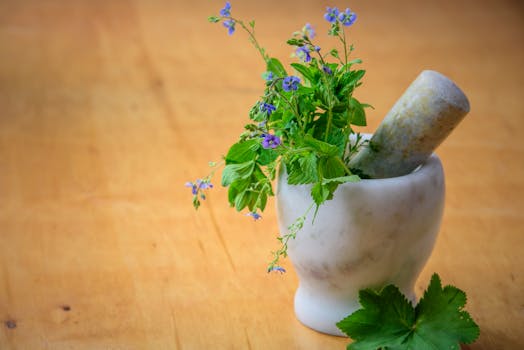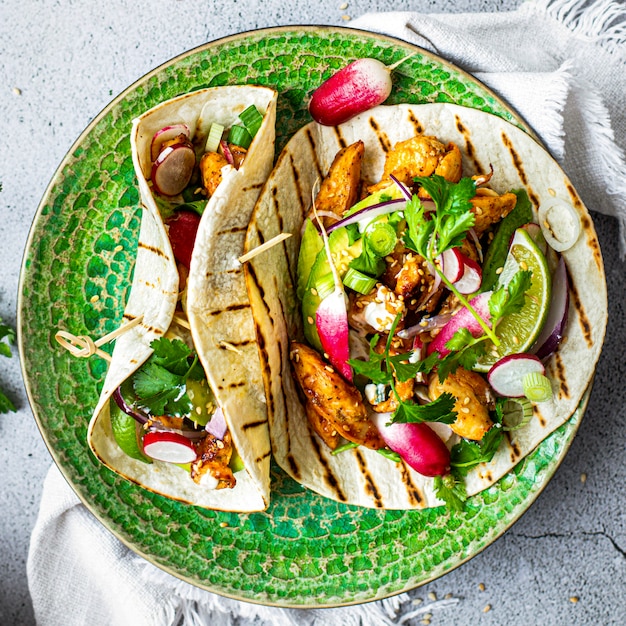Popular Herbal Mixtures from Africa

Africa is a continent with a deep-rooted tradition of using herbal mixtures for culinary, medicinal, and therapeutic purposes. These blends, often passed down through generations, draw from nature’s bounty to promote health, treat ailments, and enhance the flavors of traditional dishes. Here’s an exploration of some of the most popular herbal mixtures from various African regions, showcasing their ingredients, uses, and health benefits.
1. Agbo (West Africa - Nigeria)
Ingredients: Bitter leaves, neem leaves, guava leaves, lemongrass, ginger, garlic, and sometimes lime.
Uses: Commonly taken as a medicinal drink to treat malaria, fever, stomach ailments, and to detoxify the body.
Health Benefits: Boosts immunity, helps with digestive problems, purifies the blood, and reduces inflammation.
2. Khakibos Tea (Southern Africa - South Africa)
Ingredients: Khakibos (Tagetes minuta), sometimes combined with other herbs like rooibos.
Uses: Brewed as a tea to relieve colds, flu symptoms, and respiratory problems.
Health Benefits: Acts as a decongestant, has anti-inflammatory properties, and promotes relaxation.
3. Dawa (East Africa - Kenya and Tanzania)
Ingredients: Ginger, garlic, lemon, honey, and occasionally cinnamon or cayenne pepper.
Uses: A popular hot drink used to treat colds, flu, sore throats, and as a general immune booster.
Health Benefits: Boosts immunity, soothes sore throats, provides warmth, and has anti-bacterial and anti-inflammatory properties.
4. Bissap (West Africa - Senegal, Mali, Ghana)
Ingredients: Dried hibiscus flowers, mint leaves, ginger, and sometimes cloves or cinnamon.
Uses: Served as a refreshing drink, either hot or cold.
Health Benefits: Rich in vitamin C, helps lower blood pressure, aids digestion, and is packed with antioxidants.
5. Nyavivi (East Africa - Tanzania)
Ingredients: A mix of baobab powder, tamarind, ginger, honey, and sometimes local herbs.
Uses: Consumed as a drink to boost energy, improve digestion, and provide a rich source of vitamins.
Health Benefits: High in vitamin C, boosts energy, aids digestion, and promotes healthy skin.
6. Umuti Wamayeza (Southern Africa - Zimbabwe, South Africa)
Ingredients: A blend of various herbs like African wormwood (Artemisia afra), wild garlic, and aloe.
Uses: Traditionally used as a tonic to treat coughs, colds, fevers, and digestive issues.
Health Benefits: Anti-bacterial, anti-viral, boosts the immune system, and helps alleviate respiratory problems.
7. Abyssinian Herbal Blend (North Africa - Ethiopia)
Ingredients: A combination of rue (Tena Adam), basil, black cumin, and fenugreek.
Uses: Used in traditional teas, soups, or as a remedy for digestive issues and general health.
Health Benefits: Promotes digestion, has anti-inflammatory properties, and is rich in essential nutrients.
8. Zumbani Tea (Southern Africa - Zimbabwe)
Ingredients: Zumbani leaves (Lippia javanica), sometimes combined with lemon and honey.
Uses: Brewed as a herbal tea to relieve coughs, colds, and respiratory issues.
Health Benefits: Contains antioxidants, acts as a natural decongestant, and has anti-inflammatory properties.
9. Akan Herbal Mixture (Ghana)
Ingredients: Guinea pepper, alligator pepper, ginger, neem leaves, and bitter kola.
Uses: Taken as a health tonic to detoxify the body and to treat ailments such as malaria and stomach upset.
Health Benefits: Boosts immunity, aids digestion, has anti-microbial properties, and helps regulate blood sugar.
10. Moringa Herbal Blend (West Africa - Mali, Nigeria)
markdown
Ingredients: Moringa leaves, lemongrass, ginger, and sometimes mint.
Uses: Brewed as a tea or added to soups and stews.
Health Benefits: Rich in vitamins A, C, and E, helps lower cholesterol, promotes healthy skin, and boosts energy.
11. Aloe Ferox Mixture (Southern Africa)
Ingredients: Aloe ferox gel, honey, and sometimes mixed with ginger or lemon juice.
Uses: Consumed as a health tonic or applied externally for skin issues.
Health Benefits: Aids digestion, detoxifies the body, promotes wound healing, and improves skin health.
12. Mahogany Bark Mixture (West Africa)
Ingredients: Mahogany bark, ginger, garlic, and sometimes chili peppers.
Uses: Used as a tonic for treating malaria, high blood pressure, and digestive problems.
Health Benefits: Helps regulate blood sugar, reduces inflammation, and supports heart health.
13. Rooibos Herbal Blend (Southern Africa - South Africa)
Ingredients: Rooibos leaves, honeybush, lemongrass, and mint.
Uses: Brewed as a soothing tea that’s caffeine-free.
Health Benefits: Rich in antioxidants, aids digestion, promotes relaxation, and improves skin health.
14. Hausa Herbal Blend (Northern Nigeria)
Ingredients: Dried hibiscus, cloves, black pepper, ginger, and tamarind.
Uses: Consumed as a drink to cleanse the body and improve digestion.
Health Benefits: Promotes digestion, boosts immunity, and acts as a natural detoxifier.
15. Moringa and Soursop Leaf Mix (West Africa)
Ingredients: Moringa leaves and soursop leaves.
Uses: Brewed as a tea for general health and wellness.
Health Benefits: Rich in vitamins and minerals, boosts immunity, aids in fighting infections, and supports heart health.
The use of herbal mixtures is an integral part of African culture, offering both culinary diversity and natural health remedies. These mixtures are celebrated not only for their rich flavors but also for their potent medicinal properties that have stood the test of time. As interest in natural health solutions continues to grow worldwide, these African herbal blends provide a window into traditional wisdom, emphasizing the healing power of nature’s gifts.
1. Agbo (West Africa - Nigeria)
Ingredients: Bitter leaves, neem leaves, guava leaves, lemongrass, ginger, garlic, and sometimes lime.
Uses: Commonly taken as a medicinal drink to treat malaria, fever, stomach ailments, and to detoxify the body.
Health Benefits: Boosts immunity, helps with digestive problems, purifies the blood, and reduces inflammation.
2. Khakibos Tea (Southern Africa - South Africa)
Ingredients: Khakibos (Tagetes minuta), sometimes combined with other herbs like rooibos.
Uses: Brewed as a tea to relieve colds, flu symptoms, and respiratory problems.
Health Benefits: Acts as a decongestant, has anti-inflammatory properties, and promotes relaxation.
3. Dawa (East Africa - Kenya and Tanzania)
Ingredients: Ginger, garlic, lemon, honey, and occasionally cinnamon or cayenne pepper.
Uses: A popular hot drink used to treat colds, flu, sore throats, and as a general immune booster.
Health Benefits: Boosts immunity, soothes sore throats, provides warmth, and has anti-bacterial and anti-inflammatory properties.
4. Bissap (West Africa - Senegal, Mali, Ghana)
Ingredients: Dried hibiscus flowers, mint leaves, ginger, and sometimes cloves or cinnamon.
Uses: Served as a refreshing drink, either hot or cold.
Health Benefits: Rich in vitamin C, helps lower blood pressure, aids digestion, and is packed with antioxidants.
5. Nyavivi (East Africa - Tanzania)
Ingredients: A mix of baobab powder, tamarind, ginger, honey, and sometimes local herbs.
Uses: Consumed as a drink to boost energy, improve digestion, and provide a rich source of vitamins.
Health Benefits: High in vitamin C, boosts energy, aids digestion, and promotes healthy skin.
6. Umuti Wamayeza (Southern Africa - Zimbabwe, South Africa)
Ingredients: A blend of various herbs like African wormwood (Artemisia afra), wild garlic, and aloe.
Uses: Traditionally used as a tonic to treat coughs, colds, fevers, and digestive issues.
Health Benefits: Anti-bacterial, anti-viral, boosts the immune system, and helps alleviate respiratory problems.
7. Abyssinian Herbal Blend (North Africa - Ethiopia)
Ingredients: A combination of rue (Tena Adam), basil, black cumin, and fenugreek.
Uses: Used in traditional teas, soups, or as a remedy for digestive issues and general health.
Health Benefits: Promotes digestion, has anti-inflammatory properties, and is rich in essential nutrients.
8. Zumbani Tea (Southern Africa - Zimbabwe)
Ingredients: Zumbani leaves (Lippia javanica), sometimes combined with lemon and honey.
Uses: Brewed as a herbal tea to relieve coughs, colds, and respiratory issues.
Health Benefits: Contains antioxidants, acts as a natural decongestant, and has anti-inflammatory properties.
9. Akan Herbal Mixture (Ghana)
Ingredients: Guinea pepper, alligator pepper, ginger, neem leaves, and bitter kola.
Uses: Taken as a health tonic to detoxify the body and to treat ailments such as malaria and stomach upset.
Health Benefits: Boosts immunity, aids digestion, has anti-microbial properties, and helps regulate blood sugar.
10. Moringa Herbal Blend (West Africa - Mali, Nigeria)
markdown
Ingredients: Moringa leaves, lemongrass, ginger, and sometimes mint.
Uses: Brewed as a tea or added to soups and stews.
Health Benefits: Rich in vitamins A, C, and E, helps lower cholesterol, promotes healthy skin, and boosts energy.
11. Aloe Ferox Mixture (Southern Africa)
Ingredients: Aloe ferox gel, honey, and sometimes mixed with ginger or lemon juice.
Uses: Consumed as a health tonic or applied externally for skin issues.
Health Benefits: Aids digestion, detoxifies the body, promotes wound healing, and improves skin health.
12. Mahogany Bark Mixture (West Africa)
Ingredients: Mahogany bark, ginger, garlic, and sometimes chili peppers.
Uses: Used as a tonic for treating malaria, high blood pressure, and digestive problems.
Health Benefits: Helps regulate blood sugar, reduces inflammation, and supports heart health.
13. Rooibos Herbal Blend (Southern Africa - South Africa)
Ingredients: Rooibos leaves, honeybush, lemongrass, and mint.
Uses: Brewed as a soothing tea that’s caffeine-free.
Health Benefits: Rich in antioxidants, aids digestion, promotes relaxation, and improves skin health.
14. Hausa Herbal Blend (Northern Nigeria)
Ingredients: Dried hibiscus, cloves, black pepper, ginger, and tamarind.
Uses: Consumed as a drink to cleanse the body and improve digestion.
Health Benefits: Promotes digestion, boosts immunity, and acts as a natural detoxifier.
15. Moringa and Soursop Leaf Mix (West Africa)
Ingredients: Moringa leaves and soursop leaves.
Uses: Brewed as a tea for general health and wellness.
Health Benefits: Rich in vitamins and minerals, boosts immunity, aids in fighting infections, and supports heart health.
The use of herbal mixtures is an integral part of African culture, offering both culinary diversity and natural health remedies. These mixtures are celebrated not only for their rich flavors but also for their potent medicinal properties that have stood the test of time. As interest in natural health solutions continues to grow worldwide, these African herbal blends provide a window into traditional wisdom, emphasizing the healing power of nature’s gifts.

